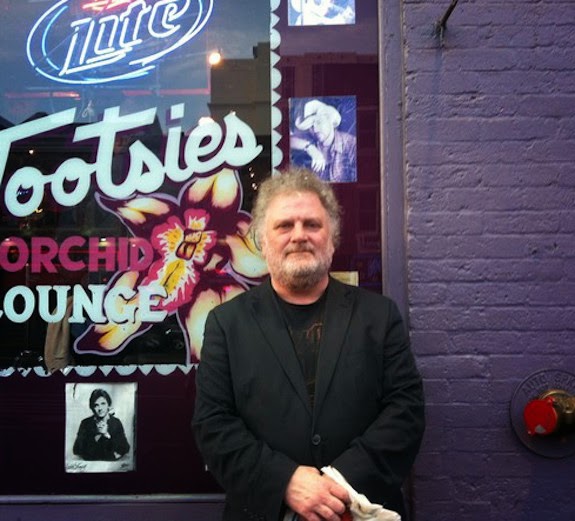Poet, playwright and theatre creator/performer, Talya Rubin’s poetry received the Bronwen Wallace Award for Emerging Writers. In 2011 she was short-listed for the Winston Collins/Descant prize for Best Canadian poem and was a finalist for the Montreal International Poetry Prize. She lives in Montreal with her husband and son.
Leaving the Island—launched at
Drawn & Quarterly on Thursday, April 16—is her first book of poems.
Carmine Starnino: The opening section of your debut describes the Scottish island of St. Kilda as a pretty
grim and deprivation-ridden place. If those poems were made into a film, which director would get it right?
Talya Rubin: Lars von Trier would no doubt do a stellar job of making the landscape particularly miserable, but the human aspect would most likely get lost in the abject misery. He tends to be so heavy handed in his bleakness these days, although I am a big fan of his earlier films.
Breaking The Waves could almost be a modern day St Kilda story. It's interesting that you think film and drama right away, as the poems do seem to contain a lot more than geography. The ghosts of that place spoke to me in so many layers. I think someone made an opera about St Kilda—heightened human drama and intensity that lends itself to opera, no doubt.
Andrea Arnold is my favourite UK filmmaker alive right now. She is very contemporary and deals with working class urban issues, so not an obvious fit, but she did do a re-make of Wuthering Heights, so I think she would be my first choice. She knows how to hone in on a detail and tell a human story like no one else making films right now.
CS: You won Harbourfront's
Battle of the Bards in March. A number of people in the audience later told me about how powerfully you read. Are the theatrical and aural aspects of your poetry important when you write?
TR: Hugely important. I'm a theatre maker and a performer as well as a writer, and when I write for theatre I literally speak the text up on my feet. I then transcribe what I've written onto paper. I believe I write poetry in a similar way, only it is by its very nature a more formal process. Most of the poems arrive with some kind of whispering in the ear though, a niggling feeling that there is language there, a rhythm of some kind, an urgency or insistence on an arrangement of words into particular meaning. I often hear things before I write them and when they arrive like that I know a poem is there. Sometimes I carry a poem around in my head for a while before committing it to the page, so voice is very strong for me, and where these words come from is certainly an inner kind of listening. And then, because I am naturally a person who likes to read words on a page out loud I have an innate desire to bring those words to life as a performer. As though the blood and heart beat behind the poem needs to get out. When I read poems by other authors, I often have to read them out loud to really know them, to hear them. The voice in our heads is one thing, but what a liberating, enlivening thing it is to read poetry out loud. I see it as a performative and a visceral experience, not in any forced way, but almost by necessity. I think it is part of what poetry is—this very aural thing at both its source and the way it gets conveyed, like you are writing/speaking from your own inner ear to your reader's/listener's. But I still think poems written with this inner ear need to have rigour on the page. There is an expectation (rightfully so) that poetry in print is going to work visually and read in a more literary, fixed way, and this aural aspect is never going to replace an awareness of line and form. It is about how that listening is translated into something more formal that is going to work on the page.
CS: The last section of the book is comprised of prose poems describing a stay on a Greek island. Why the prose poem? What can it do that a traditional poem can't?
TR: I think the prose poem is a perfect example of this aural tradition. It compresses language so that lines are bumping up against one another, so that breath is almost compressed as well. The prose poem also has an inherently lyric aspect, it sinks us into language so deep we are drowning. And for me, the job of the prose poem is then to make sure the reader can swim, can get to the surface for air—but only just. That the rush of language doesn't entirely overwhelm and the choices that are made are still exacting and ripe with precise meaning. I tried to break those prose poems into more traditional line breaks at one point as an experiment, and it was completely off, it was like trying to force something into the wrong space. Not because the lines wouldn't hold on their own, but because the form is entirely different. I like Charles Simic's take that a prose poem is: "a burst of language following a collision with a large piece of furniture." There is action in a prose poem and an absurd leap. And I think this particular suite of poems was asking for that. It is a series of poems about a really heightened experience, it contains the personal and the mythic, it holds a vast span of time; ancient history and the here and now. So the form seemed right for the content. There is something impossible about a prose poem. The image of those glass bottles with boats in them comes to mind. I always think, "how did those things get in there?" And a prose poem to me is like that, it is like an impossibly large thing fitting into a small thing. And the impossibility of it—the wonder of it—is the form itself.








.jpg)
.jpg)

.jpg)












